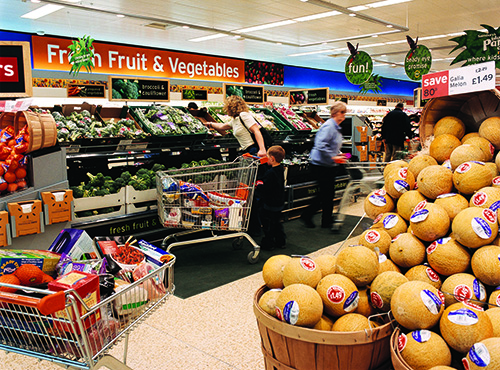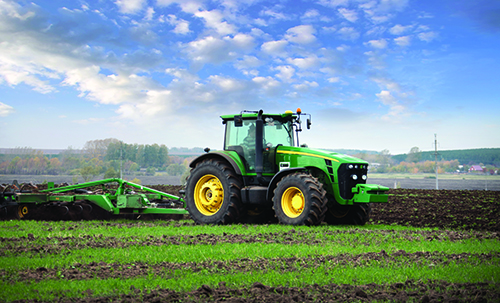Food companies must put a greater emphasis on traceability
UCD’s Professor Patrick Wall warns that the food chain is only as secure as its weakest link.
Irish food companies are obsessed with the challenge of managing financial risk to the detriment of their ability to cope with potential food scares, according to Professor Patrick Wall, from UCD’s Institute of Food and Health.
“Ensuring that the proper food safety and traceability capabilities are in place represent the foundations upon which every modern food business must be based,” he said. “The maintenance of the highest possible animal welfare standards is equally important. All of these challenges are moving targets. So food companies must always be on red alert where these crucially important issues are concerned.
“The agri-food chain is extremely complex, hence the need for our farming and food businesses to maintain a total focus on all the associated traceability criteria. Some food businesses are victims of their own success and outgrow their management capabilities and plant facilities posing a public health risk. At the opposite end of the spectrum, others introduce requirements in excess of the legal requirements and subject themselves to third party audits.
“There is a move by the competent authorities from inspecting premises to auditing food safety management systems. The latter satisfies the authorities that the food business has procedures in place to produce safe food on an ongoing basis whereas the former just gives a snapshot of how things are on the day of the visit.
“This move needs to be accelerated to ensure the activities of the national inspectorates are adding maximum value. One good systems audit can be much more effective than numerous inspections. The food chain is only as secure as its weakest link and there should be no gaps in the continuum of supervision from animal feed mills to the point of sale to consumers.”
Bright future
Wall made these comments while reflecting on the global developments that have taken place within the global milk industry during 2015. But he did confirm that the Irish milk sector can look forward to an extremely bright future.
“The current downturn in dairy prices has been brought about by the global imbalance between milk output and production. But these factors will realign themselves over the coming months,” he said. “In the meantime numerous opportunities are opening up, which will provide the dairy industry with tremendous opportunities to add value during the years ahead.
“The Irish dairy sector is already a world leader in the production of infant formula. But it is now evident that specific and tailored diets will be required at the differing stages of human development, in order to optimise health and the quality of life.”
Walls cited the specific benefits associated with older people retaining their muscle mass. “This will ensure that people will remain more active in their advancing years,” he said. “Already in the United States medical professionals are indicating that ‘90’ is the new ‘60’ and ‘60’ is the new ‘30’.
“The relevance of all this for the Irish dairy industry is the fact that whey, once regarded as a waste product from the dairy industry, is the most effective protein source in terms of maintaining muscle mass in older people.
“Whey is already used as a component in sports’ nutrition supplements. However, there is tremendous potential for its inclusion in the diets consumed by older people. All of this is good news for the Irish dairy industry.”
 Wall was the first Chief Executive of the Irish Food Safety Authority and contributed to the setting up of this science based consumer protection agency. He was the second Chairperson of the European Food Safety Authority, a pan EU Agency with a remit is to provide comprehensive scientific advice on food safety for the entire food and feed supply chains and issues directly impacting on these such as animal welfare, animal health and plant health.
Wall was the first Chief Executive of the Irish Food Safety Authority and contributed to the setting up of this science based consumer protection agency. He was the second Chairperson of the European Food Safety Authority, a pan EU Agency with a remit is to provide comprehensive scientific advice on food safety for the entire food and feed supply chains and issues directly impacting on these such as animal welfare, animal health and plant health.
Wall believes passionately in the future of Irish farming and food. “We are a green island, in the truest sense of the term. Ireland is pretty much unique in being able to produce milk, beef and lamb from grazed grass. This is a remarkable advantage, which we must build on for the future.”
“The food chain is only as secure as its weakest link and there should be no gaps in the continuum of supervision from animal feed mills to the point of sale to consumers.”
Global growth
Wall is quick to confirm that the world’s population is set to grow by 50 per cent over the next four decades. “India and China have growing affluent middle and upper classes seeking a more western diet and premium foods so the demand for food will grow,” he said.
“This forecast of increased demand for food rings hollow for many farmers who are currently producing product for close to the cost of production. However, the agri-food sector may be the spearhead of economic recovery as farmers are producing something that is essential for life.”
The volatility associated with world market commodity prices is not something that European farmers find easy to cope with making market support measures of some sort necessary by the EU to maintain some balance in the supply demand equation.
The current uncertainty of how things will pan out is curtailing long-term investments in the primary sector as even the most optimistic risk takers need some idea of the likely rewards. Fortune favours the brave and primary producers are not short of courage. More strategic alliances are necessary throughout the supply chain and an equitable distribution of margin is not an unreasonable aspiration if sustainability is to be achieved and issues like carbon footprints, environmental protection and animal welfare are to be addressed.
Food imports
Wall pointed out that economies of scale and cheaper labour costs are giving some countries a competitive advantage in the global food market and many countries now find it more economic to import most of their food. “However, free trade has to be safe trade emphasising the need for equivalent standards for all those players trading in the global market place,” he said.
“The longer the food chain, and the more players within it, the more opportunities for things to go wrong or for criminal adulteration to occur with resulting adverse health consequences for consumers.
“One country’s problem can rapidly become another’s as contaminated product and ingredients can rapidly be disseminated. No country can afford to be complacent as they are only as secure as the standards of the weakest supplier from whom they import product, and a substandard domestic producer can put a nation’s citizens at risk and jeopardise a country’s reputation as a food exporter or as a tourist destination.”






